May 1, 2014
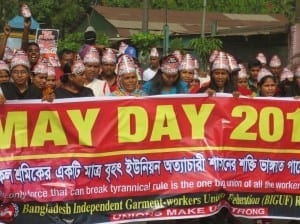
Members of Bangladesh Independent Garment Workers Federation marching today. Credit: Solidarity Center
More than 100 years ago, workers striking for an eight-hour day and living wages declared May 1 an annual date for international labor rights to honor workers and raise awareness of their struggles.
Around the world, many workers are still fighting for those basic rights. In Bangladesh, garment workers seeking to make their workplaces safe are forming unions, despite sometimes formidable odds, including violent attacks against workers and organizers.
Since last year, after the collapse of Rana Plaza and when garment workers began a serious push to organize and seek official recognition of their unions from the government, more than 100 unions have been registered. In the three years prior, only two unions were allowed to register.
“Now that we have a union, if (wage) payments are delayed, we can find out what the problem
is and work can go on,” said Rumi Akhter, a union leader. Rumi and her co- workers recently formed a union at a Weltex apparel factory in Dhaka, the capital (see video).
he Solidarity Center has been bolstering worker rights defense efforts in Bangladesh—including providing safety and health training, legal support and union building—for years. It recently established an emergency fund to help organizers and worker activists injured or otherwise harmed as they fight for better wages and working conditions. The country is one of dozens where the Solidarity Center assists local unions, worker centers and community groups to empower workers on the job and in civil society.
“In low-wage economies in general, companies find little reason to protect the rights and interests of workers—and corporate self-regulation has proven a faulty tool for ensuring healthy and dignified workplaces,” says Alonzo Suson, Solidarity Center Bangladesh country program director. “Without the relative strength of a union to represent them, vulnerable and impoverished workers cannot fight alone for their rights.”
May Day is a time to celebrate the historic achievements of trade unions. And as the International Trade Union Confederation (ITUC) points out, it is especially a time reaffirm our commitment to organize workers everywhere and support their fights for: freedom of association and collective bargaining; mnimum wages on which workers can live; universal social protection; and safe, healthy and sustainable jobs.
Apr 25, 2014
A trial opens today for 23 Cambodian trade union leaders and workers in Phnom Penh Municipal Court for participating in rallies in January calling on the government to increase the minimum wage for Cambodia’s ready-made garment workers. The majority of those arrested have been detained for months in a remote prison known as CC3.
IDH, a global network of human rights organizations, called for the Cambodian government to drop all charges. “Cambodia’s judiciary must end this baseless prosecution of garment workers and human rights defenders who have been severely beaten, arbitrarily arrested and detained for several months for peacefully demonstrating to demand an adequate minimum wage.”
Throughout their detention in what legal rights observers describe as exceptionally harsh conditions, the men have been refused medical care and denied release on bail, even in cases of medical necessity. Legal rights observers also say the 23 men have been denied due process and, until last week, were unsure whether they would even be allowed to attend their own trial. If convicted, they face up to up to five years’ imprisonment, as well as fines ranging between $1,000 and $2,500.
Since a violent crackdown by security forces in the streets of Phnom Penh in early January left five workers dead and more than 40 injured, trade union and worker rights have been under attack in Cambodia. Hundreds of garment workers have been dismissed, trade union leaders have faced lawsuits and garment industry representatives have called on the government to denounce the International Labor Organization (ILO) conventions that Cambodia has ratified.
Meanwhile, the government has failed to conduct an independent investigation into the violent crackdown, and the injured workers and the families of those killed have received no compensation. Negotiations about increasing the minimum wage remain stalled. Workers are demanding the government increase the monthly minimum wage for garment and footwear workers from $80 to $160.
“Free the 23” has become a rallying cry for international worker and human rights communities, which have repeatedly called for the release of all detainees.
The Solidarity Center is joining with representatives of international worker and human rights groups and foreign embassies in Cambodia in observing the trial to remind the Cambodian government of its duty to ensure due process and the rule of law.
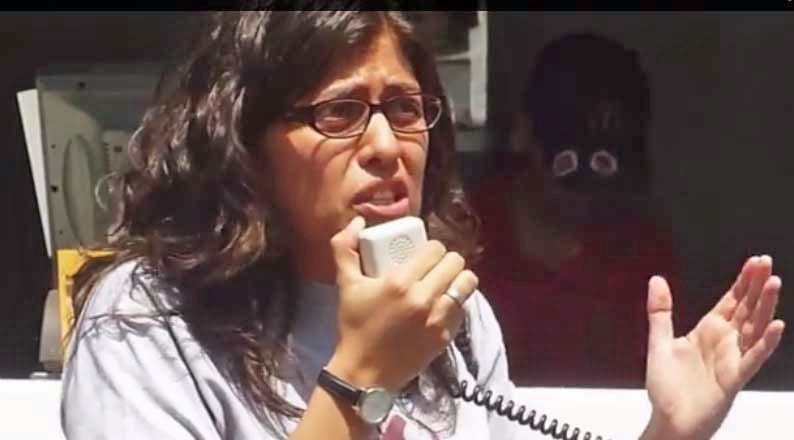
Apr 24, 2014
Alejandra Ancheita, founder and executive director of the Mexico City-based ProDESC (Project for Economic, Cultural, and Social Rights), is one of three finalists for the prestigious international Martin Ennals Award for Human Rights Defenders.
Ancheita, a Mexican lawyer and activist who leads the fight for the rights of vulnerable and excluded workers, migrants, communal landowners and indigenous communities, founded ProDESC in 2005. ProDESC is a long-time Solidarity Center ally whose work includes an ongoing campaign seeking justice for miners denied their right to organize for improved working conditions at the La Platosa mine in La Sierrita, Durango, Mexico.
“Alejandra is an unsung hero. She stands up in the face of widespread violence and impunity in Mexico—often risking her life so that Mexican workers can have justice,” said Solidarity Center Executive Director Shawna Bader-Blau. “Alejandra’s difficult and important work shines a spotlight on abuse and exploitation that generally goes unnoticed. We hope this honor helps diminish the risks she and her colleagues face every day.”
The Martin Ennals Award for Human Rights is selected by the international human rights community and given to human rights defenders who have shown deep commitment and face great personal risk. Members of the organization include Human Rights Watch and Amnesty International.
Watch a video about Ancheita.
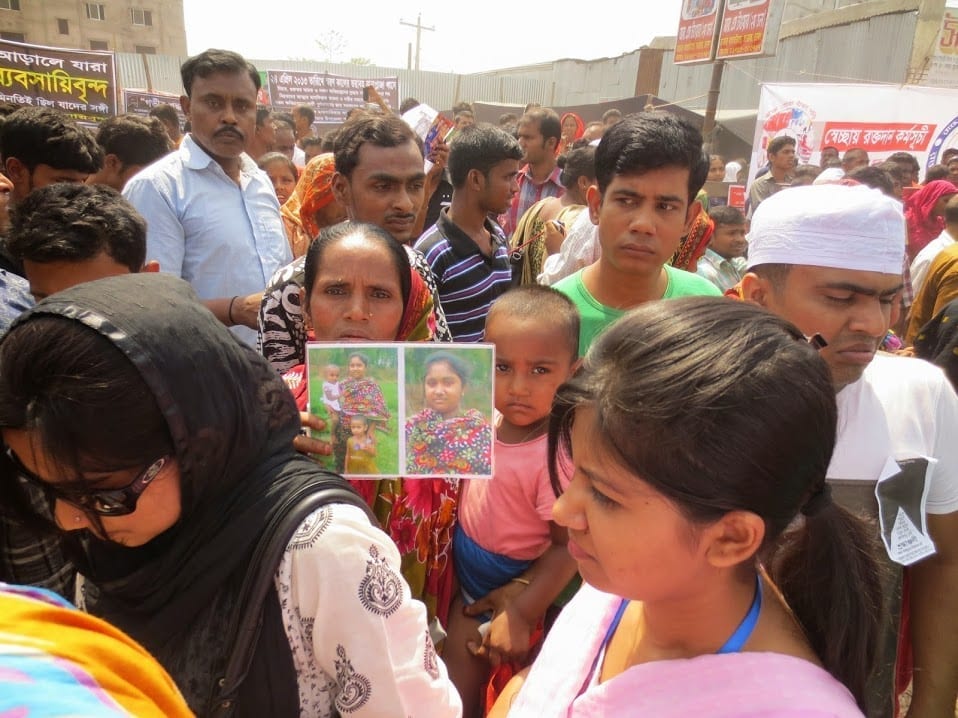
Apr 24, 2014
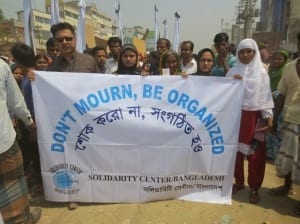
Garment workers are seeking to form unions to change unsafe working conditions like those at Rana Plaza. Credit: Solidarity Center
Thousands of Bangladeshis began gathering before dawn at the site of Rana Plaza, the multistory building that collapsed one year ago today, killing more than 1,110 garment workers and injuring at least 2,500.
Relatives of those killed, survivors of the tragedy and union activists made human chains and marched with banners and signs demanding worker rights, safe workplaces and justice for survivors and the families of those killed. Packing the plaza, marchers carried banners reading, “Pay up, long overdue for Rana Plaza Victims,” and “I don’t want to die for fashion.” Family members held photos of loved ones killed in the unnecessary disaster.
Dalia, a union leader from the Natural Apparels Workers Union (part of the Bangladesh Garment and Industrial Workers Federation, BGIWF) said that the compensation some of the survivors received was insufficient. She also said that families of missing workers should also receive compensation.
Garment workers and union leaders said that a year after the collapse of Rana Plaza, which housed five garment factories, promises made to the families of the victims remain unfulfilled. They called on the government to declare April 24 “labor safety day.”
Trade unions and other civil society organizations held daylong programs to mark the anniversary. Labor organizations placed wreaths at the monument erected in front of the collapsed factory site and the global union, IndustriALL, held a special program as part of its monthlong observance. The local government held a special prayer session as did the Bangladesh Garment Manufacturers and Exporters Association, at its building at Karwan Bazar in Dhaka, the capital.
Labor organizations taking part included the Bangladesh National Garment Workers Employees League (BNGWEL), BGIWF, the National Garments Workers Federation (NGWF) and Sommilito Garment Sramik Federation (SGSF).
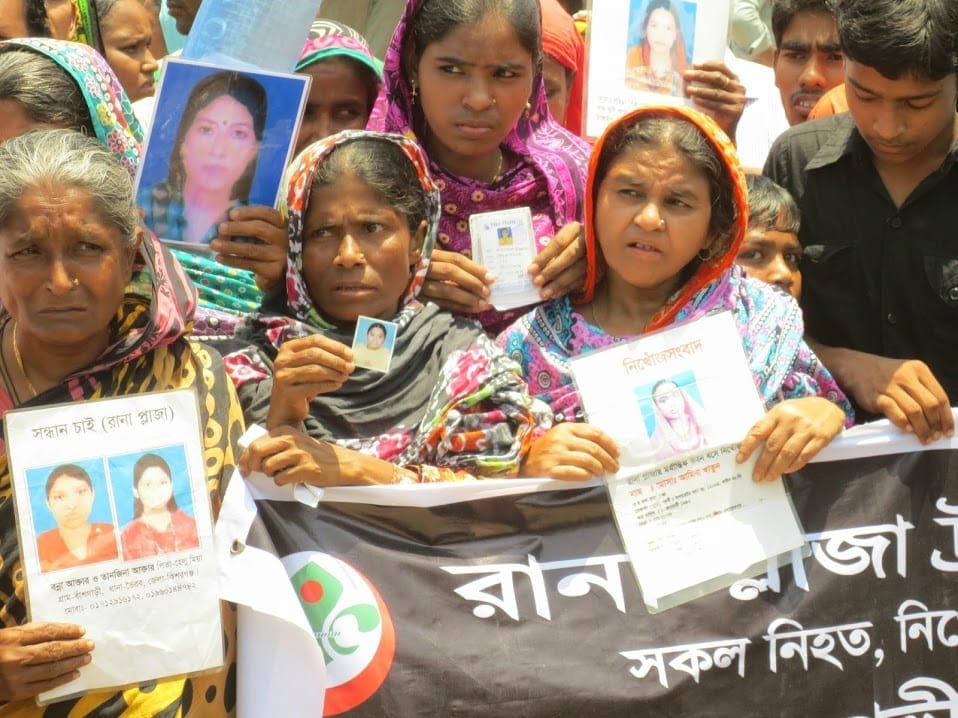
Apr 24, 2014
One year ago today, as the walls of the multistory Rana Plaza building collapsed around her, Moriom Begum was trapped, injured and unable to move in the dark, surrounded by the lifeless bodies of her co-workers.
A sewing operator at New Wave Style, one of five garment factories in Rana Plaza, Morium sat pinned beneath furniture for two days before she was rescued. More than 1,100 garment workers, mostly young women, were killed when the building pancaked around them. At least 2,500 garment workers were injured. Most, like Moriom, sustained such serious and life-altering injuries that they cannot work and may never again be able to do so, throwing their survival—and the survival of their families—into question.
Since the Rana Plaza disaster, 54 people have died or been injured at garment factories in Bangladesh, according to data compiled by Solidarity Center staff in Dhaka, the Bangladesh capital. The Rana Plaza tragedy closely followed the deadly Tazreen factory blaze, which killed 112 garment workers in November 2012. Survivors and the families of workers killed in both disasters have received little, if any, compensation, and many are struggling to survive.
Although labor organizations and prominent retailers created a $40 million compensation fund last December to aid the families of workers killed and injured at Rana Plaza, less than $20 million has been donated.
The government has taken several positive steps since the Rana Plaza tragedy, including accepting union registrations. To date, more than 100 have filed for official recognition. Yet when workers try to exercise their rights for safer workplaces, they are often harassed and threatened.
Garment workers seeking to form unions are intimidated by factory managers, who sometimes threaten to kill them, according to a recent Human Rights Watch report. Union organizers like Hasina, have been attacked, beaten, and in some cases, left for dead, when they spoke with garment workers about forming a union. If garment workers do succeed in registering their union, factory managers often prevent the workers from negotiating contracts for safer working conditions and living wages.
Garment workers and other workers in Bangladesh’s export-processing zones are subject to a different, much weaker set of labor laws than workers in the rest of the country, even though the $20 billion garment industry is Bangladesh’s biggest earner of foreign exchange.
The safety and lives of Bangladesh’s workers will not improve until they can exercise their rights, organize freely, be fairly compensated and ensure that their workplace is not a death trap. Reforming labor laws so they meet international standards for freedom of association and collective bargaining rights is part of the solution, says A. K. M. Nasim, senior legal counselor at the Solidarity Center’s office in Dhaka.
Employers and the government also must protect and respect the right of workers to form and join independent unions. Workers must not be intimidated, harassed, verbally or physically assaulted or fired from their jobs when seeking to form a union or represent their own interests, including the right to refuse to enter or remain in a dangerous workplace.
Moriom, who lost her right hand and suffers from constant pain, said the government and employers should understand the value of other people’s life.
If they value life, she said, they will ensure that no more garment workers are injured or killed.





